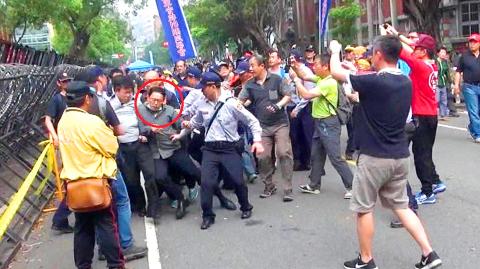Premier Lin Chuan (林全) yesterday condemned violence against local government heads and lawmakers allegedly committed by opponents of pension reform proposals, calling on the National Police Agency to expedite an investigation into the incidents.
Lin made the comments during a Cabinet meeting amid complaints from Democratic Progressive Party (DPP) lawmakers that police officers did not properly enforce the law when hundreds of demonstrators protesting pension reforms resorted to violence against them outside the legislature in Taipei on Wednesday in an attempt to disrupt a planned legislative review of the government’s proposals.
The use of violence by protesters disrupted the functioning of the nation’s democratic institutions, Lin said, pledging to work toward creating clearer and more effective guidelines for law enforcement officials.

Photo: copied by Wang Kuan-jen, Taipei Times
Continued delays of the government’s pension reforms would lead to substantial setbacks for societal and national development, he said.
Lin said the pension reforms aim to create a sustainable civil servants’ pension fund and redistribute the financial burden of future generations more fairly.
It is inevitable that an issue so close to the personal interests of many people would lead to protests and, in a democratic society, certain liberties are granted for people to express themselves, but they “must not transgress relevant national systems or the bounds of law enforcement,” Lin said.
Cabinet spokesman Hsu Kuo-yung (徐國勇) said the Executive Yuan is to take responsibility for investigating the alleged violent incidents, including those against Taipei Mayor Ko Wen-je (柯文哲) and Taoyuan Mayor Cheng Wen-tsan (鄭文燦).
“The Executive Yuan expresses its profound sadness at the events that transpired yesterday and unequivocally condemns the acts of violence. We hope protesters will express their demands rationally, and stop hindering lawmakers and officials from conducting official business in the legislature,” Hsu said.
Meanwhile, police have so far confirmed 15 separate alleged incidents of protesters breaking the law and 26 alleged perpetrators from video footage of the protests, the Taipei Police Department said.
A total of 13 individuals had been identified as of press time last night and they were to be questioned, the department said, adding that Democratic Progressive Party (DPP) Legislator Wang Ding-yu (王定宇) pressed charges earlier yesterday and SET-TV (三立電視) said it would also press charges for damage to one of its outside broadcast vans.
Among the list of identified suspects were Taipei Metro Union executive member Wang Yu-wen (王裕文), who was alleged to have struck DPP Legislator Lin Chun-hsien (林俊憲) with his elbow.
Peng Ke-ying (彭克英), a member of the Pension Reform Oversight Alliance, allegedly attacked Cheng, Wang Ding-yu, New Power Party Legislator Hsu Yung-ming (徐永明) and Minister of Civil Service Chou Hung-hsien (周弘憲).
One military veteran was arrested on Wednesday for smashing the windshield of the SET-TV van with a hammer, police said.

US President Donald Trump yesterday announced sweeping "reciprocal tariffs" on US trading partners, including a 32 percent tax on goods from Taiwan that is set to take effect on Wednesday. At a Rose Garden event, Trump declared a 10 percent baseline tax on imports from all countries, with the White House saying it would take effect on Saturday. Countries with larger trade surpluses with the US would face higher duties beginning on Wednesday, including Taiwan (32 percent), China (34 percent), Japan (24 percent), South Korea (25 percent), Vietnam (46 percent) and Thailand (36 percent). Canada and Mexico, the two largest US trading

AIR SUPPORT: The Ministry of National Defense thanked the US for the delivery, adding that it was an indicator of the White House’s commitment to the Taiwan Relations Act Deputy Minister of National Defense Po Horng-huei (柏鴻輝) and Representative to the US Alexander Yui on Friday attended a delivery ceremony for the first of Taiwan’s long-awaited 66 F-16C/D Block 70 jets at a Lockheed Martin Corp factory in Greenville, South Carolina. “We are so proud to be the global home of the F-16 and to support Taiwan’s air defense capabilities,” US Representative William Timmons wrote on X, alongside a photograph of Taiwanese and US officials at the event. The F-16C/D Block 70 jets Taiwan ordered have the same capabilities as aircraft that had been upgraded to F-16Vs. The batch of Lockheed Martin

China's military today said it began joint army, navy and rocket force exercises around Taiwan to "serve as a stern warning and powerful deterrent against Taiwanese independence," calling President William Lai (賴清德) a "parasite." The exercises come after Lai called Beijing a "foreign hostile force" last month. More than 10 Chinese military ships approached close to Taiwan's 24 nautical mile (44.4km) contiguous zone this morning and Taiwan sent its own warships to respond, two senior Taiwanese officials said. Taiwan has not yet detected any live fire by the Chinese military so far, one of the officials said. The drills took place after US Secretary

THUGGISH BEHAVIOR: Encouraging people to report independence supporters is another intimidation tactic that threatens cross-strait peace, the state department said China setting up an online system for reporting “Taiwanese independence” advocates is an “irresponsible and reprehensible” act, a US government spokesperson said on Friday. “China’s call for private individuals to report on alleged ‘persecution or suppression’ by supposed ‘Taiwan independence henchmen and accomplices’ is irresponsible and reprehensible,” an unnamed US Department of State spokesperson told the Central News Agency in an e-mail. The move is part of Beijing’s “intimidation campaign” against Taiwan and its supporters, and is “threatening free speech around the world, destabilizing the Indo-Pacific region, and deliberately eroding the cross-strait status quo,” the spokesperson said. The Chinese Communist Party’s “threats